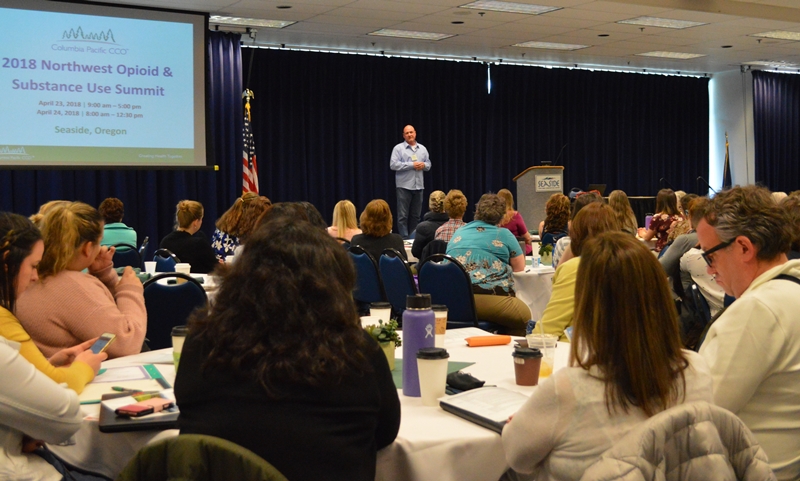Heather White, Community Health Improvement Coordinator, Columbia-Pacific CCO
One of my favorite annual events since coming to work at Columbia Pacific CCO is the Northwest Opioid & Substance Use Summit which took place this year on April 23rd and 24th in Seaside. People from across disciplines and perspectives come together at this summit to learn from each other and have conversations about what we’re all doing around topics such as opioid prescribing, substance use disorders, chronic pain, and community prevention and intervention.
This year, a key thread from each of these conversations was “trauma-informed care.” Each presentation was unique and yet equally powerful, and each represented a different piece of the puzzle addressing these tough topics in our rural, coastal communities. For example:
- Alan Evans, CEO of Helping Hands, shared his own journey from trauma and addiction to his current mission of housing and re-entry without judgment
- Ari Wagner, MS, from Greater Oregon Behavioral Healthcare, Inc., showcased how trauma-informed clinics, communities, and law enforcement can positively impact the substance use disorder epidemic
- Emily Fanjoy and Valerie Bundy, LPC, NCC, from the Tillamook County Women’s Resource Center presented on the intersections of intimate partner violence, chronic pain, and substance use disorders
- Representatives of the PowerCLEAN program in Columbia County shared how their partnership with Columbia Pacific CCO to provide holistic fitness, nutrition, and support has helped people stay in recovery
- Mike McNickle, MPH, MPA, REHS, Director of Clatsop County Public Health shared how they have partnered with Jordan’s Hope for Recovery to start a successful and safe needle exchange program
- Ron Jackson, MSW, LICSW, from University of Washington highlighted why Medication-Assisted Treatment (MAT) is so important to increasing success in recovery
- Denise Weiss, RN, Jeff Luty, MD, and Terra Marzano, LCSW, shared their team-based approach to MAT care at the Rinehart Clinic
- DeAnna Pearl, MAT, BS, CPS, spoke about the importance of building resilience early in childhood to reduce the risk of substance use disorders and other chronic health issues
Each presentation highlighted the hope we all share. Each person’s work and passion make a difference in our communities. Tillamook County is currently experiencing the fastest increase in the rate of per-capita prescription opioid overdose deaths and has the highest level of high-dose opioid prescribing in the state. The statistics can be disheartening but great work is being done.
According to summit attendee, Eric Swanson, Executive Director of Strategy & Business Development with Tillamook Regional Medical Center, “Opioid use/abuse is often measured in terms of the deaths that result – a very sobering statistic. However, we often forget about the other societal impacts of addiction that are much more difficult of measure, i.e., broken homes, impact on children and other family members, loss of employment, as well as the costs to the criminal justice and health care systems. While these statistics are often much harder to quantify, the depth and breadth of this crisis is much greater than many of us care to consider. As we come together as a community in crisis, we must consider all the societal costs of this addiction and look for holistic strategies to impact all sides of this very complex disease.”
But what can I do?
We can all play a part! Here are some important things anyone could start doing today.
- Be a safe, loving adult in the lives of children around you. Research shows, again and again, that when kids have trustworthy and caring adults in their lives, who listen to them and model healthy ways to cope with stress, their risk of all sorts of chronic conditions (including chronic pain and substance use disorders) decreases greatly. If we ask ourselves “what happened to you” instead of “what’s wrong with you,” that will go a long way toward creating lasting change in our communities.
- Store and dispose of your medications safely. Lock your medicine cabinets. Monitor how quickly you run out of your medications. And when you’re done with them or when they expire, take them to a safe disposal site. This keeps prescription medicine out of the wrong hands and out of our water system. If you missed the drug takeback event on Saturday, there are year-round medication drop boxes where you can dispose unused medicine. For more info, visit: https://www.oregonpainguidance.org/regions/north-coast/drug-take-back/
- If you or someone you know takes high doses of opioids, whether prescribed or illicit, consider carrying Naloxone. It is a life-saving drug that can reverse an overdose until paramedics arrive. In rural communities like ours, we don’t always have time to wait for help. Anyone can ask for a prescription for Naloxone at Safeway or Fred Meyer pharmacies. Prices may vary by health insurance. And our Good Samaritan Laws protect anyone calling 911 from being arrested for possession or use of illegal substances. For more info, visit: http://www.oregon.gov/oha/PH/PREVENTIONWELLNESS/SUBSTANCEUSE/OPIOIDS/Pages/naloxone.aspx#pharm

